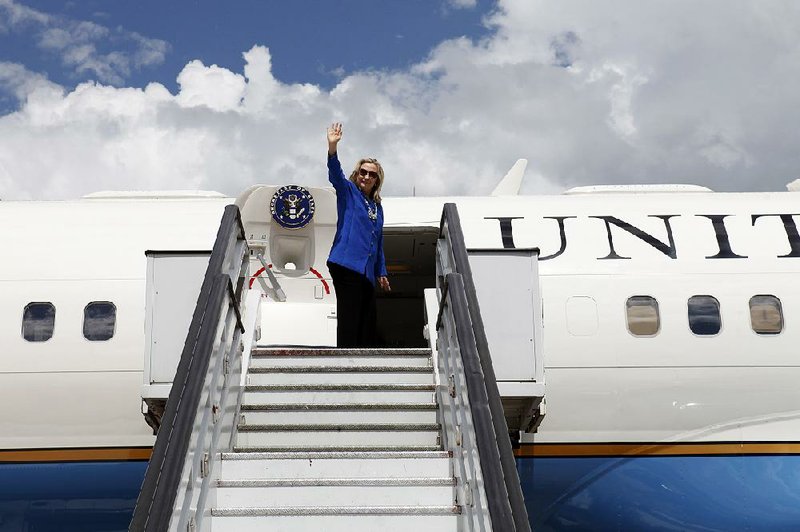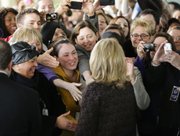WASHINGTON — The most-traveled secretary of state in U.S. history, Hillary Rodham Clinton stepped down from her Cabinet post Friday after calling for the United States to become more involved internationally in promoting democracy and human rights.
“We need to widen the aperture of our engagement,” she said during her farewell speech the previous day.
Clinton’s approach to foreign policy was a departure from that of her predecessors under President George W. Bush who told the world: “Either you are with us or you’re with the terrorists” and launched wars in Afghanistan and Iraq.
Even Clinton’s ideological foes give her credit for being a tireless and skilled diplomat.
“She’s as good a secretary of state as we’ve had, and I’m sorry to see her go,” said John Negroponte, the deputy secretary of state and director of national intelligence under Bush.
Negroponte waved off questions about Clinton’s change of course from Bush’s foreign policy.
“She has a very comprehensive view of foreign policy,” he said in an interview. “Security, economics and our values - all three, not one to the exclusion of the others. She has had a balanced approach.”
Clinton was already a political celebrity before President Barack Obama picked her to lead the State Department. As a Cabinet chief, Clinton’s popularity seemed only to increase.
“It would have been easy for her to rely on her star power alone,” said Spencer Boyer, who served under Clinton as deputy assistant secretary of state for European and Eurasian affairs. “But she inspired everyone around her by her dedication.”
During her four years at the State Department, Clinton visited 112 countries, more than any previous State Department chief. She logged more than 1 million miles of travel, visiting countries from tiny Togo, in West Africa, to China, where she made her first visit as secretary.
One of her trips was to Little Rock for an appearance at the Clinton Presidential Center in October 2011.
Former President Bill Clinton said then that his wife had succeeded “because she understands our world, she’s well-regarded all over the world.”
“She’s both good at the public role, but also at managing the foreign service and the whole development of the foreign policy and integrating it with national security policy,” Bill Clinton said. “She has the confidence of the military and the confidence of the CIA, and the confidence of the White House. That helps a lot.”
One photograph, which went viral on the Internet, summed up her public image.Sitting apart from a crowd of staff members on a C-17 transport plane above the Mediterranean Sea, Hillary Clinton sits in cool confidence at a table of papers, wearing sunglasses and sending texts on her phone.
“The president [Obama] brought into office a policy of engagement,” said P.J. Crowley, who was a State Department spokesman from 2009-11. “He talked about reaching out to the world. Hillary Clinton was the face of that strategy. She used her celebrity to great effect.”
In December, the 65-yearold Clinton seemed to go into hibernation. She suffered a concussion, and then spent four days in a hospital being treated for a blood clot near her brain.
As she recuperated, congressional Republicans and some members of the media grew impatient. Though she had accepted responsibility for an attack on the American Consulate in Benghazi, which killed four Americans, including the American ambassador to Libya Christopher Stevens, many questions about the attack remained.
For weeks, State Department spokesmen kept mum about Benghazi.
But when her health improved, and she ended her silence, Clinton emerged in fighting form, confidently parrying questions in a pair of Capitol Hill hearings held on the Benghazi attack. She also appeared with Obama on 60 Minutes, granting the news show a lengthy interview in late January.
On Thursday, the eve of her last day at the department’s helm, Clinton gave a valedictory address in Washington hosted by the Council on Foreign Affairs.
“We’ve revitalized American diplomacy and strengthened alliances,” she told the crowd of reporters, academics, corporate executives and foreign-policy experts. “Our global leadership is on firmer footing than many have predicted.”
Clinton disputed the notion that the United States has reached its zenith as a global power.
“The declinists are dead wrong,” Clinton said, calling the United States an “indispensable nation.”
Being indispensable, she said, “requires us to not only lead alone, but to lead coalitions and networks.” Some believe that the Benghazi attack, which occurred on the 11th anniversary of the Sept. 11 terrorist attacks on the United States, will tarnish her State Department legacy.
Clinton’s main contribution was to promote “cultural diplomacy,” said Ainslie Embree, a professor emeritus of history at Columbia University.
By relentlessly shuttling from country to country and promoting equal rights without imposing American ideals on foreign cultures, Embree said, Clinton worked hard to restore the United States’ standing abroad.
“We have somehow got to get the message across that our worst people don’t speak for the American people,” he said.
Clinton’s supporters say her successes as secretary include opening up relations with Burma and elevating the agency’s anti-terrorism efforts. She instituted quadrennial reviews of the agency and started the Center for Strategic Counter Terrorism Communications, to counter anti-American claims on the Internet.
Most important, according to Crowley, Clinton reached out to people in other countries who didn’t control the reins of power, especially women. When she visited other countries, she insisted on holding televised question-and-answer sessions, often at universities.
One such event was in Jeddah, Saudi Arabia, in 2010. Women in full-length abaya robes “shrieked” in joy when Clinton entered the room, Crowley said.
“They knew, even in one of the most conservative societies for women in the world, what she has meant for the cause of women’s rights,” he said.
“When she visits, it’s special,” agreed U.S. Sen. John Boozman, R-Ark., who called Clinton a “very good” ambassador.
Still, Boozman and other Republicans criticized her foreign policy, saying she did not do enough to promote democracy in the Middle East, particularly after the 2011 “Arab Spring” uprisings that dislodged dictators in Egypt, Libya and Tunisia and sparked a civil war in Syria, where fighting has raged for nearly two years.
“In the Middle East, we’ve been wishy-washy and indecisive,” Boozman said.
During her Jan. 23 testimony on Capitol Hill, Democrats saluted Clinton’s service, and some pressed her to run for president in 2016. Clinton said she’s “not inclined” to run, but she will have support if she does. Supporters last week filed a draft Clinton super political action committee, called Ready for Hillary, to raise money for a possible campaign.
But Republicans say her handling of the Benghazi attack would haunt her on the campaign trail.
U.S. Sen. Rand Paul, R-Ky., told Clinton that she should have been “more on the job.” By not reading daily State Department cables sent from Libya, Clinton was guilty of not preventing the worst tragedy since the 2001 terrorist attacks, Paul said. “I would have relieved you of your post.”
Clinton responded that the independent review board assigned to study the attack had blamed four people for not responding properly to warnings from Libya. They have been put on administrative leave, she said.
She defended her response to congressional inquiries, saying the Obama administration had sent 30 people to testify before Congress about the Benghazi attacks and that she had appointed the independent board.
“I said ‘make it open, tell the world,’” she told Paul.
Some other Republicans say Clinton won’t leave behind memorable accomplishments as secretary. Her travel schedule pulled her attention away from Foggy Bottom, the campuslike complex of buildings that houses the State Department, said Stephen Yates, who served in national security roles in the George W. Bush White House and was an adviser to Newt Gingrich in the former House speaker’s failed 2012 presidential run.
“What has she done? What has she fixed?” Yates asked. “If you’re traveling all the time, are you managing the building?”
U.S. Rep. Tim Griffin said “there are a lot of questions still unanswered.” The Arkansas Republican added, “That’s a big part of her legacy.”
Arkansas’ U.S. Sen. Mark Pryor said he doesn’t believe that the Benghazi response will tarnish Clinton’s legacy.He said the neoconservatives who fashioned Bush’s foreign policy wrongly concluded that the world yearned for a democracy based on the U.S. model. That insistence, Pryor said, alienated a good part of the world.
“She came in with a message that this was a new day,” Pryor said.
Clinton said the architects of Cold War diplomacy created a foreign-policy “Parthenon.” She described it as a solid structure with straight lines and a strong foundation of international organizations such as the United Nations and the World Bank. The edifice, she said, was backed by “hard power” - the promise that as a superpower, the United States would use military force if it was deemed necessary.
Today, foreign policy needs a new architecture that is more “Frank Gehry than ancient Greece,” Clinton told the crowd during her Council of Foreign Relations speech. Architect Gehry’s “post-structuralist” buildings often seem to defy gravity and conventional building practices. Clinton said future secretaries of state, including her successor, John Kerry, will have to mix hard power and unconventional approaches. The emphasis on persuasion rather than coercion has been dubbed “soft power.”
“There are limits to what soft power can achieve, and there are limits to what hard power can achieve,” Clinton said. “That’s why from Day One, I have been talking about smart power.”
Front Section, Pages 1 on 02/03/2013



